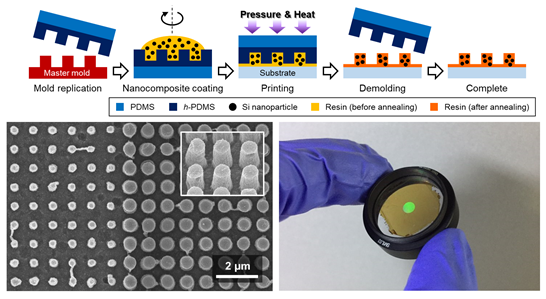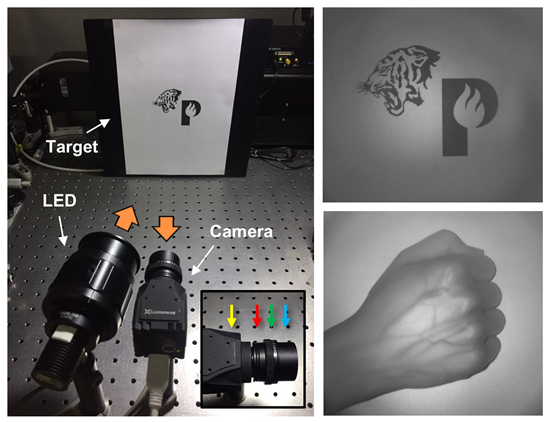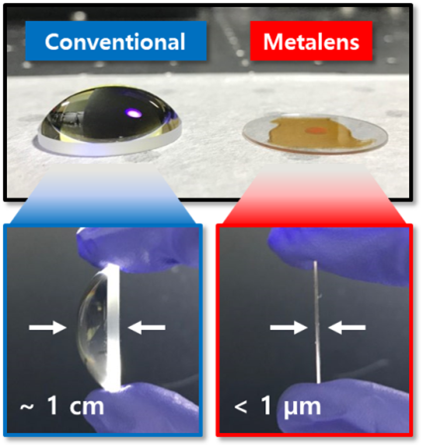
[한국방송/김영곤기자] Domestic researchers Than conventional refractive lenses 10,000Developed ultra thin film lenson With success Suma
Significantly reduce the size of the camera in the phone The way you can open.
Ministry of Science and Technology Information and Communication(Minister Ki-Young Choi, Below ‘Ministry of Science and ICT‘)Pohang University of Science and Technology(President Moo-Hwan Kim) Department of Mechanical Engineering/Chemical worker
Department Professor Junseok Noh Research TeamLee Korea University Department of Materials Science and Engineering Professor Heon Lee Research Team, Samsung Electronics Advanced Institute of Technology Imaging
DWith Vice Lab Han Seung-hoon Master Team, The performance of existing refractive lenses maintainBut Thickness is 10,000Times thin(Hair
All 100Fold thin level) infrared ray Development of ultra-thin lens and mass production technologySaid that.
this is Large and heavy conventional optical device*Overcome the limitations ofResearch results Metamaterial**Greatly contributed to the commercialization of
Acknowledge the possibility of being undergroundReceiveOh, a global academic journal ACS Nano(IF=14.588)on 2021year Onemonth OneDays came
Line was announced.
* Optical element: Light amplitude, Phase, Devices that can control various characteristics such as frequency
** Metamaterial: A new material made of artificial atoms that mimic atoms existing in nature
※ Thesis name: Printable Nanocomposite Metalens for High-Contrast Near-Infrared Imaging
※ Author Information: Noh Junseok(Corresponding Author), Lee Heon(Co-corresponding author), Kwanho Yoon(MyOneauthor), Kim Kwan(Joint systemOneauthor), Kim Se-woom, Han Seung-hoon gun 6persons
A smartphone with a lens that collects light, DSLR For the latest electronic and optical devices such as cameras Essential parts
as Conventional refractive lenses Big and heavy, Limitations in which performance decreases as the volume decreasesThere was.
The camera that goes into the smartphone is used to reduce image distortion. 8~9Use a composite lens consisting of four refractive lenses.
I use it, The thickness of the composite lens Because it is difficult to reduce The so-called camera pops out behind the smartphone ‘Katuk
Splash‘ Problems arise.
Also, DSLR Minimum for refractive lenses used in cameras 500gin As we go to high-performance products 4kgBeyond
Because Thin and light lenThe demand for zu is very high.
The researchers Developed lenses with high performance and small volumeIn order to do this, a metamaterial-based lens was studied.
place, Metamaterials have various optical properties such as sound refraction and ultra-high refraction that conventional materials cannot provide. Freely controllable
I can Ultra-thin flat lens, High resolution hologram, Implementing new optical devices like invisibility cloak
This is possibleHaW This is a field where a lot of research is being conducted all over the world..
However, electron beam lithography, which was previously used for manufacturing other materials*Is fair Slow speed and very expensive unit price
Because Made through thisMade MeThe cost of other materials is also high, sophraseThe laboratory
Couldn’t get out of the level.
* Electron beam lithography: The electron beam is focused through a strong voltage to the nanometer levelI can process the pattern of
Furnace process technology
In order to overcome these limitations, the researchers have optical properties suitable for metamaterial realization, and at the same time, they can
possible Nanocomposite Based new nano molding materialAnd it can be molded in one process. there is One Step Prin
TechnologySucceeded in developing.
Nano molding material is photosensitive* Made by mixing nanoparticles with resin. this Case type and concentration of nanoparticles
According to the optical properties of the nano molding material oreBecause it can be controlled in a range, it is mainly used for making metamaterials.
It can replace the existing material that came, The unit price of the material is also Compared to existing materials, it is significantly cheaper and thus economical
All.
* Photosensitive: A substance that normally exists in a liquid state but hardens into a hard plastic when exposed to light.
In addition, the one-step printing technology of the new nano molding material Compared to lithography 100Fast speed
Making road metamaterialsdoing Is possible and is difficult to be compatible with the existing process technology. Curved substrate and oilEven on the smoke board
Implement metamaterialBecause recently a lot of AttentionReceiving Also applicable to wearable devicesWhat to do
In the futureThe possibility of development into the furnace is more expected..
Meanwhile, the researchers are based on silicon nanocomposites and printing technology. headThan the thickness of the collar 100Thinner than times One my
Chromometer-thick ultra-thin film Develop meta lensAnd through this, it is combined with an actual optical system to succeed in imaging.
To verify the practical applicability of the research results..
Professor Junseok Noh “The ultra-thin metalenses implemented in this studyHistorical characteristics have Conventional infrared refraction
Than the lens 10,000When the belly is thinAt the door Big heavy Solve various problems caused by refractive lenses Will be able to,
Future Infrared Endoscope, CCTV, For various fields such as night vision goggles It is expected that application will be possible.” The impact of high research
Explained.
The result of this research is electromagnetic·Securing the core technology of metamaterials in the field of mechanics roomScience and technology in pursuit of research on Yonghwa
Department Global Frontier Business(Wave energy Extreme Control Research Center) Was carried out with support from.

